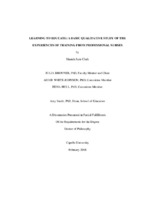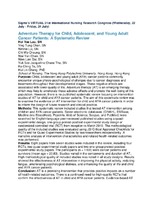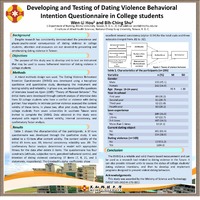| dc.contributor.author | Chan, Claudia Kor Yee | en |
| dc.date.accessioned | 2014-11-17T13:46:45Z | |
| dc.date.available | 2014-11-17T13:46:45Z | |
| dc.date.issued | 2014-11-17 | |
| dc.identifier | INRC14E11 | |
| dc.identifier.uri | http://hdl.handle.net/10755/335199 | |
| dc.description | International Nursing Research Congress, 2014 Theme: Engaging Colleagues: Improving Global Health Outcomes. Held at the Hong Kong Convention and Exhibition Centre, Wanchai, Hong Kong | en |
| dc.description.abstract | Session presented on Saturday, July 26, 2014: Young people's attitude towards dating violence and perceived barriers in responding peers in abusive dating relationships may contribute to their willingness to help peers in abusive relationships. Purpose: This study explored the university students' intention to prevent dating violence and identify the barriers in responding peers in abusive dating relationships by using qualitative approach. Methods: Twenty university students were recruited at Dating Cafe Ambassadors Programme to educate peers in helping to prevent dating violence on university campus. Participants were followed for 3 workshops of participant observations and a focus group interview. An interview guide was used for data collection. Interview questions included what is the definition of dating violence, why do you/don't you help peers in abusive relationships, do you perceive it is your responsibility to help, and describe your expectation of a healthy relationship. Data were analysed using content analysis. Results: Results showed that the barriers in responding peers in abusive dating violence included low awareness of dating violence on campus; and lack of skills and resources to help. Conclusion: The lessons learned from the qualitative study findings will help in develop and refine dating violence prevention and intervention for university students. | en |
| dc.language.iso | en | en |
| dc.subject | Intention to help | en |
| dc.subject | Barriers | en |
| dc.subject | Dating violence | en |
| dc.title | Am I Responsible to Help Peers in Abusive Dating Relationships?: Learning From a Qualitative Study | en |
| dc.title.alternative | Symposium: Empirically-Based Bystander Education Programmes to Prevent Dating Violence in University Students: Lessons from U.S. and Hong Kong Experience | en |
| dc.type | Presentation | en |
| dc.rights.holder | <p>
All rights reserved by the author(s) and/or publisher(s) listed in this item record unless relinquished in whole or part by a rights notation or a Creative Commons License present in this item record.
</p><p>
All permission requests should be directed accordingly and not to the Sigma Repository.
</p><p>
All submitting authors or publishers have affirmed that when using material in their work where they do not own copyright, they have obtained permission of the copyright holder prior to submission and the rights holder has been acknowledged as necessary.
</p> | |
| dc.description.note | Items submitted to a conference/event were evaluated/peer-reviewed at the time of abstract submission to the event. No other peer-review was provided prior to submission to the Henderson Repository. | |
| dc.type.category | Full-text | en |
| dc.contributor.department | Non-member | en |
| dc.author.details | Claudia Kor Yee Chan, RN, MSc | en |
| dc.conference.name | 25th International Nursing Research Congress | en |
| dc.conference.host | Sigma Theta Tau International, the Honor Society of Nursing | en |
| dc.conference.location | Hong Kong | en |
| dc.date.conferenceyear | 2014 | en_US |
| dc.description.reviewtype | Abstract Review Only: Reviewed by Event Host | en |
| dc.description.acquisition | Proxy-submission | en |





